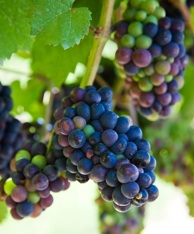
Features
Production
Research
Grapes, grape extracts may lower risk of cardiovascular disease
November 14, 2008 By Marg Land
 November 7, 2008 — A growing body
November 7, 2008 — A growing body
of research data suggests that consuming foods rich in polyphenols from
grapes – including red wine – helps reduce the risk of heart disease,
according to a review article in the November issue of Nutrition.
November 7, 2008 — A growing body of research data suggests that consuming foods rich in polyphenols from grapes – including red wine – helps reduce the risk of heart disease, according to a review article in the November issue of Nutrition Research.
 “Consumption of grape and grape extracts and/or grape products such as red wine may be beneficial in preventing the development of chronic degenerative diseases such as cardiovascular disease,” write Dr. Wayne R. Leifert and Dr. Mahinda Y. Abeywardena, of Commonwealth Scientific and Industrial Research Organisation in Adelaide, Australia.
“Consumption of grape and grape extracts and/or grape products such as red wine may be beneficial in preventing the development of chronic degenerative diseases such as cardiovascular disease,” write Dr. Wayne R. Leifert and Dr. Mahinda Y. Abeywardena, of Commonwealth Scientific and Industrial Research Organisation in Adelaide, Australia.
The authors reviewed the accumulating evidence that grape polyphenols work in many different ways to prevent cardiovascular and other “inflammatory-mediated” diseases. Polyphenols are natural antioxidants found in grapes and some other plant foods. Their types and actions vary, depending on where in the grape they are found. Grape seeds, grape skin, and grape juice contain several types of polyphenols, including resveratrol, phenolic acids, anthocyanins, and flavonoids.
Through their antioxidant effects, grape polyphenols help to slow or prevent cell damage caused by oxidation. Polyphenols decrease oxidation of low-density lipoprotein cholesterol (“bad” cholesterol)—a key step in the development of atherosclerosis (hardening of the arteries). Grape polyphenols also have other protective effects on the heart and blood vessels, including actions to reduce blood clotting, abnormal heart rhythms, and blood vessel narrowing. It's not yet clear exactly how these benefits of polyphenols occur, although there is evidence of effects on cellular signaling and on the actions of certain genes. The wide range of health-promoting effects suggests that several different, possibly interrelated mechanisms may be involved.
So far, most of the evidence on grape polyphenols comes from laboratory experiments and animal studies. However, a few studies support the disease-preventing benefits of grapes in humans. Studies in patients treated with grape seed extracts have shown improvements in blood flow and cholesterol levels. In other studies, drinking Concord grape juice has improved measures of blood flow in patients with coronary artery disease and lowered blood pressure in patients with hypertension.
At a time of growing interest in the use of “functional foods and nutraceuticals” to promote heart health, grapes and grape polyphenols are “attractive candidates” for use in such supplements, Drs. Leifert and Abeywardena believe. “Therefore,” they conclude, “supplementation with grape seed, grape skin or red wine products may be a useful adjunct to consider for a dietary approach in the prevention of cardiovascular diseases, although additional research is required to support such a strategy.”
Print this page